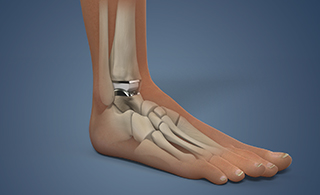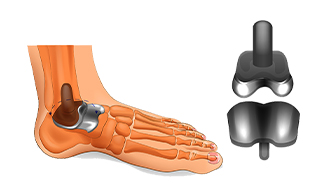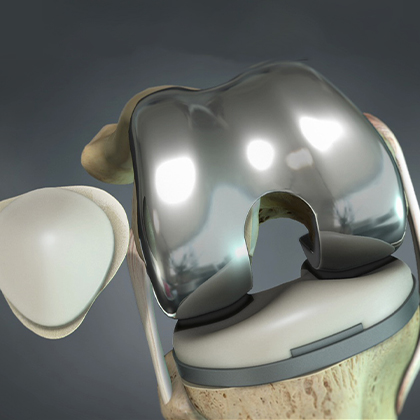
Ankle Replacement
Ankle Replacement Ankle replacement surgery, also known as total ankle replacement or ankle arthroplasty, is performed to treat ankle arthritis by reducing the pain, enhancing stability of the ankle joint & improving overall ankle mobility. However, this is considered to be a last resort and is recommended only in cases where no other treatment works.
Total ankle replacement involves replacing the damaged parts of the ankle joint with metal or plastic implants. Ankle arthritis can occur in any age, from general wear & tear. It may also be a result of ankle injuries, ankle fractures or certain medical conditions.

The ankle is a complex joint that allows rotation & pivoting of the foot in relation to the leg. The Ankle joint is formed by three separate bones. These are Tibia or the larger bone in the leg, fibula or smaller bone on the outside of the leg & talus, the bone that connects the leg to the foot.
Cartilage at the ends of these bones allows them to glide smoothly. Damage or wear down of the cartilage resulting from injury or disease leads to friction during movement. This leads to osteoarthritis in the ankle. Over a period of time, it wears away the bone surfaces, leading to bone spurs & stiffness in the joint.
Ankle Replacement Surgery is a good option for patients who are unable to manage their ankle arthritis symptoms with non surgical treatments like:
- Physiotherapy
- Ankle Braces
- Pain medications like NSAIDs
- Corticosteroid injections
It is recommended in cases such as the following:
- Middle to old aged individuals
- Individuals with no significant comorbidities
- Normal or low body mass index
- Well aligned & stable hind foot
- Good soft tissue conditions
Not every patient with ankle arthritis is a candidate for ankle replacement surgery. It may not be a good solution for those with severely deformed or unstable ankles It is also not recommended is the patient has:
- Diabetes
- Obesity
- Circulatory disorders
- Bone Infections.

Your Orthopedic surgeon is likely perform a physical exam & an X Ray to determine if you a candidate for this procedure. If this is not the right procedure for you, your doctor may recommend ankle fusion or ankle arthroscopy.
As with any joint replacement surgery, ankle replacement too has a few potential complications such as
- Blood clots
- Infections
- Loosening of replacement parts
- Nerve or blood vessel damage

+91 123456789
eliteOrthopedics@gmail.com
Yashoda Hospitals Hitec City










